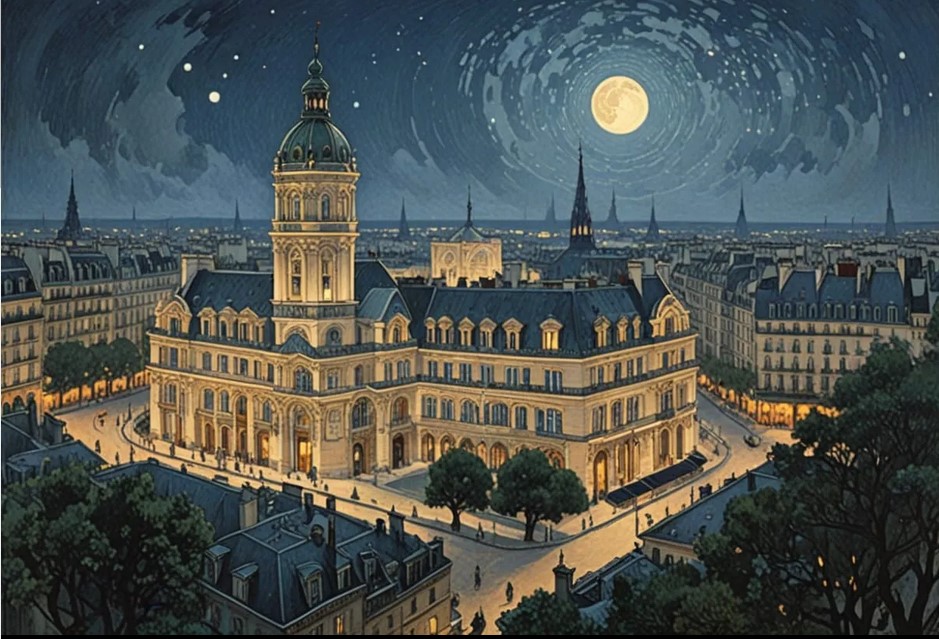Centre de la Mer et des Eaux: Difference between revisions
No edit summary |
No edit summary |
||
| (4 intermediate revisions by one other user not shown) | |||
| Line 1: | Line 1: | ||
;[[ | ;[[5th Arrondissement]] | ||
[[]] | [[File:Center de mer.jpg]] | ||
<br> | <br> | ||
<br> | <br> | ||
== Introduction == | == Introduction == | ||
(Through 1905 this is a building under construction. As the aquariums are filled, it becomes a more Kindred interesting place)<br> | |||
The Centre de la Mer et des Eaux was an aquarium and museum of marine life located in the 5th arrondissement in the building of the Institut Océanographique at 195, rue Saint-Jacques, Paris, France. It closed in November 2010. Dedicated to the dissemination of scientific culture concerning the marine world and to the development of knowledge of the ocean, it included a library, seven aquariums, and presented permanent and temporary exhibitions, as well as scientific mediations, animations and workshops. | |||
The Institut Océanographique was established in 1906 by Albert I, Prince of Monaco, and inaugurated in 1911. In addition to research laboratories and amphitheaters, the institute contained the Centre de la Mer et des Eaux dedicated to educating the public about marine life and related environmental issues. Its displays presented aspects of oceanography and marine technology, as well as scale models, reconstructions of marine landscapes, and aquariums. | |||
The center included a set of 6 aquariums, each containing from 500 to 4,000 litres (130 to 1,060 US gal) of seawater for a total volume of 15,000 litres (4,000 US gal), as follows: | |||
Pool 1 – fish of the coral reef | |||
Pool 2 – reef coral and fauna that live within it | |||
Pool 3 – Brightly colored fish | |||
Pool 4 – Small fish | |||
Pool 5 – Clown fish and sea anemone | |||
Pool 6 – The French Atlantic coast (shellfish, sea urchins, sea anemones, and starfish, in water chilled to 12 °C) | |||
An additional terrarium contained turtles that had been given to the museum when they had become too large and aggressive for home cultivation. Special displays explained the richness of life in coastal and around hydrothermal vents, and illustrated the relationships between humans and four types of shellfish (scallop, oyster, cowry, and the nautilus) | |||
== Source == | == Source == | ||
https://en.wikipedia.org/wiki/Centre_de_la_Mer_et_des_Eaux | |||
---- | ---- | ||
<br> | <br> | ||
---- | ---- | ||
Latest revision as of 23:23, 23 February 2025
Introduction
(Through 1905 this is a building under construction. As the aquariums are filled, it becomes a more Kindred interesting place)
The Centre de la Mer et des Eaux was an aquarium and museum of marine life located in the 5th arrondissement in the building of the Institut Océanographique at 195, rue Saint-Jacques, Paris, France. It closed in November 2010. Dedicated to the dissemination of scientific culture concerning the marine world and to the development of knowledge of the ocean, it included a library, seven aquariums, and presented permanent and temporary exhibitions, as well as scientific mediations, animations and workshops.
The Institut Océanographique was established in 1906 by Albert I, Prince of Monaco, and inaugurated in 1911. In addition to research laboratories and amphitheaters, the institute contained the Centre de la Mer et des Eaux dedicated to educating the public about marine life and related environmental issues. Its displays presented aspects of oceanography and marine technology, as well as scale models, reconstructions of marine landscapes, and aquariums.
The center included a set of 6 aquariums, each containing from 500 to 4,000 litres (130 to 1,060 US gal) of seawater for a total volume of 15,000 litres (4,000 US gal), as follows:
Pool 1 – fish of the coral reef Pool 2 – reef coral and fauna that live within it Pool 3 – Brightly colored fish Pool 4 – Small fish Pool 5 – Clown fish and sea anemone Pool 6 – The French Atlantic coast (shellfish, sea urchins, sea anemones, and starfish, in water chilled to 12 °C)
An additional terrarium contained turtles that had been given to the museum when they had become too large and aggressive for home cultivation. Special displays explained the richness of life in coastal and around hydrothermal vents, and illustrated the relationships between humans and four types of shellfish (scallop, oyster, cowry, and the nautilus)
Source
https://en.wikipedia.org/wiki/Centre_de_la_Mer_et_des_Eaux
